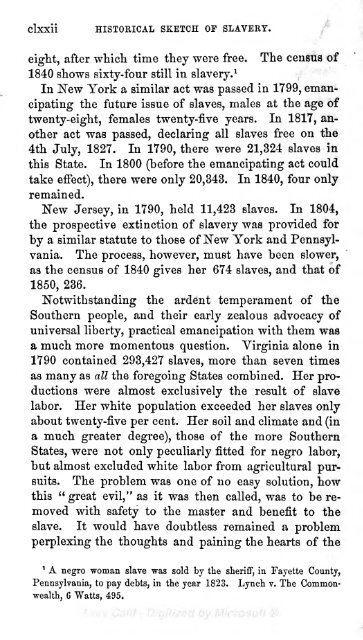Untitled - African American History
Untitled - African American History
Untitled - African American History
You also want an ePaper? Increase the reach of your titles
YUMPU automatically turns print PDFs into web optimized ePapers that Google loves.
clxxii HISTOKICAL SKETCH OF SLAVERY.<br />
eight, after which time they were free. The census of<br />
1840 shows sixty-four still in slavery. 1<br />
In New York a similar act was passed in 1799, eman-<br />
cipating the future issue of slaves, males at the age of<br />
twenty-eight, females twenty-five years. In 1817, another<br />
act was passed, declaring all slaves free on the<br />
4th July, 1827. In 1790, there were 21,324 slaves in<br />
this State. In 1800 (before the emancipating act could<br />
take effect), there were only 20,343. In 1840, four only<br />
remained.<br />
New Jersey, in 1790, held 11,423 slaves. In 1804,<br />
the prospective extinction of slavery was provided for<br />
by a similar statute to those of New York and Pennsylvania.<br />
The process, however, must have been slower,<br />
as the census of 1840 gives her 674 slaves, and that of<br />
1850, 236.<br />
Notwithstanding the ardent temperament of the<br />
Southern people, and their early zealous advocacy of<br />
universal liberty, practical emancipation with them was<br />
a much more momentous question. Virginia alone in<br />
1790 contained 293,427 slaves, more than seven times<br />
as many as all the foregoing States combined. Her productions<br />
were almost exclusively the result of slave<br />
labor. Her white population exceeded her slaves only<br />
about twenty-five per cent. Her soil and climate and (in<br />
a much greater degree), those of the more Southern<br />
States, were not only peculiarly fitted for negro labor,<br />
but almost excluded white labor from agricultural pursuits.<br />
The problem was one of no easy solution, how<br />
this " great evil," as it was then called, was to be removed<br />
with safety to the master and benefit to the<br />
slave. It would have doubtless remained a problem<br />
perplexing the thoughts and paining the hearts of the<br />
1 A negro woman slave was sold by the sheriff, in Fayette County,<br />
v. The Common-<br />
Pennsylvania, to pay debts, in the year 1823. wealth,<br />
Lynch 6 Watts, 495.


